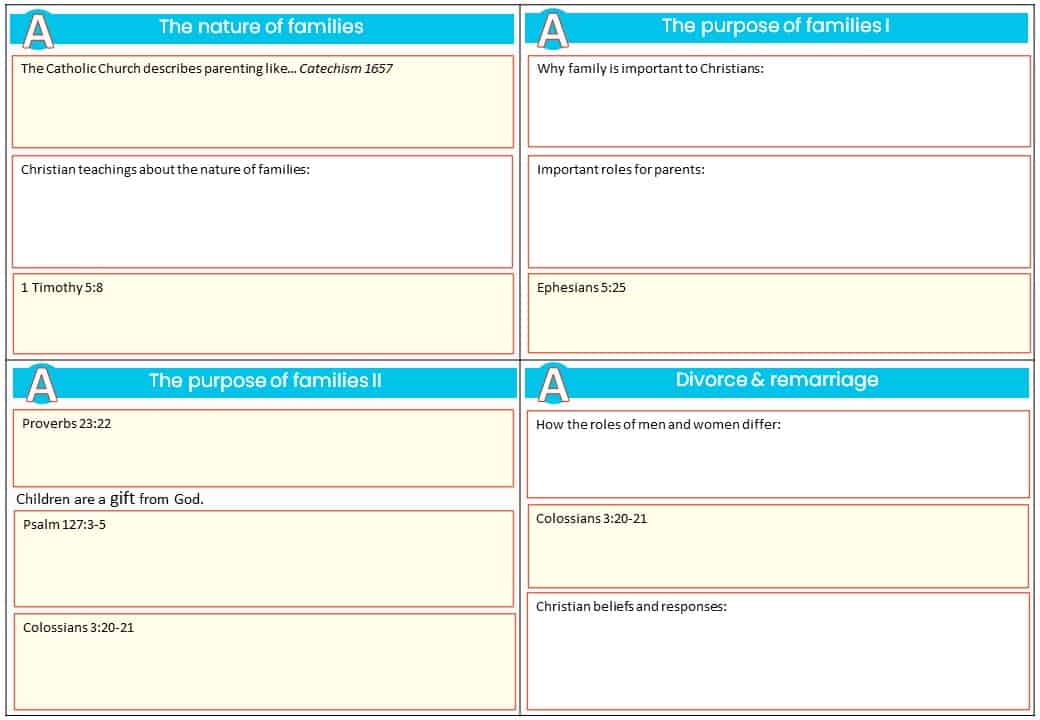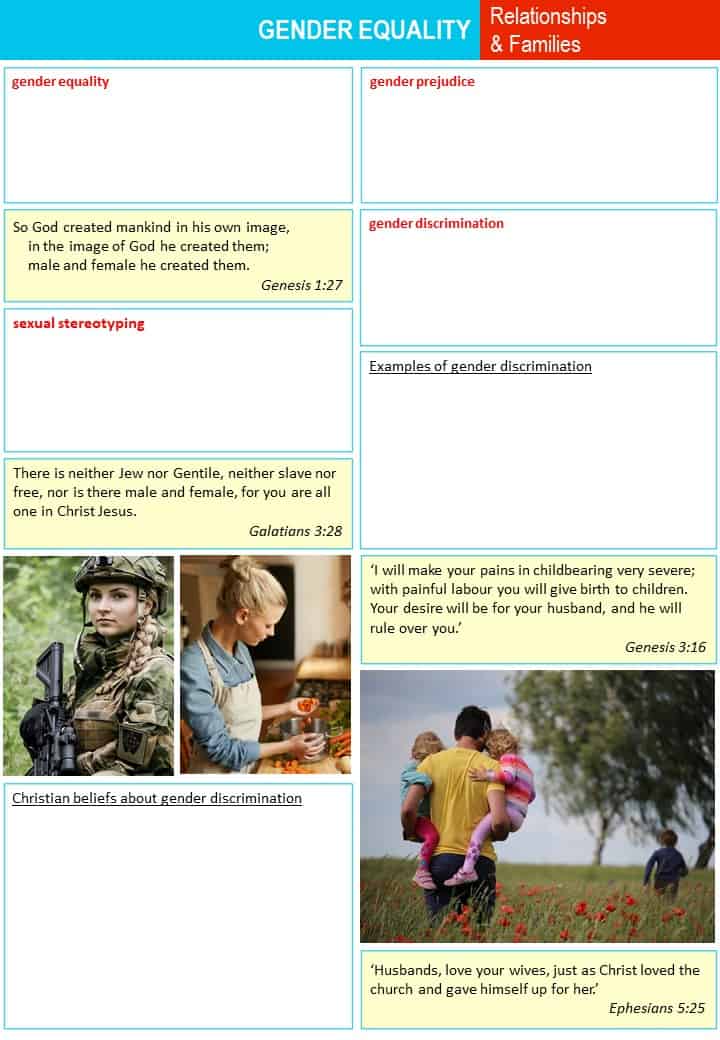Theme A
Families and gender equality
- The nature of families:
• the role of parents and children
• extended families and the nuclear family.
- The purpose of families:
• procreation
• stability and the protection of children
• educating children in a faith.
The nature of families
Give two religious beliefs about the nature of the family. (2)
Spec 1
- Should be based on the marriage of two people – male and female
- extended family
- ordained by God or commanded in scripture
- a duty to marry
- a vocation for some believers only.
The purpose & role of parents
Give two religious beliefs about the nature of the family. (2)
Spec 1
- Should be based on the marriage of two people – male and female
- extended family
- ordained by God or commanded in scripture
- a duty to marry
- a vocation for some believers only.
Explain two religious beliefs about the purpose of families. (5)
2019
Generally all religions view the main purpose of families as:
• providing stability for family members and society
• protects children, supplying their basic needs and keeping them safe
• place where children are socialised so they can grow up and contribute to society
• place to educate children in a faith
• place for companionship and mutual love between the adults who cannot or choose not to be parents, etc
Christianity
- Couples should ‘submit to one another out of reverence for the Lord’ (Ephesians 5:21) / meaning there should be love and respect between them
- children have a duty to obey, love and respect their parents
- ‘Listen to your father who gave you life and do not despise your mother when she is old.’ (Proverbs 23:22)
- ‘Honour your father and mother’ (Exodus 20:12) / children are gifts from God so parents should respect their dignity
- ‘Fathers do not exasperate your children; instead bring them up in the training and instruction of the Lord.’ (Ephesians 6:4)
- children should also be raised within the Christian faith, etc
Judaism
- Children are commanded to ‘Honour your father and mother’ (Exodus 20:12)
- to respect them
- ‘Listen to your father… and do not despise your mother…’ (Proverbs 23:22)
- the mother in particular passes down the faith to the next generation
- children learn through the celebration of festivals within the home both religious practices and the values of charity and hospitality, etc
Give two teachings about the role of parents in a religious family. (2)
2022
- All religions teach that the main role for parents is to provide a secure and stable environment for children to grow up in
- provide children with all that they need to be able to grow and develop
- specific traditional roles for fathers and mothers
- bring them up in the faith
- teach them right from wrong
- to discipline children, ‘Spare the rod and spoil the child’ (Proverbs 13:24)
- set an example to the children by living the faith
- teach children to pray – worship at home or in the place of worship
- encourage them to become full members of the faith
- persuade them to do good
- give them a good education
- have children – ‘Be fruitful and multiply’ (Genesis)
- be role models for the children – ‘Honour your father and mother’ (Exodus 20:12)
- ‘Fathers do not exasperate your children; instead bring them up in the training and instruction of the Lord.’ (Ephesians 6:4)
- ‘And you shall teach them (God’s words) to your children, to speak of them when you sit in your house and when you walk on the way…’ (Deuteronomy 11:19)
Explain two religious beliefs about the role of parents in a religious family. (5)
Spec 1
- All religions teach that a key role for parents is to provide their children with all the necessities of life/provide a secure and stable background for children to grow up in/teach their children right from wrong/giving them moral standards to live by.
- All religions teach parents should set an example to children by living the faith/educating and raising children within the faith/bringing them to maturity and full membership of the faith
- teaching them to pray
- take part in worship in the home or in the place of worship.
Christianity
- It is the duty of Christian parents to raise their children in the faith.
Depending on their denomination, Christians are expected to ensure
their children receive religious instruction - attend religious schools
- participate in rites of passage ceremonies, eg. christening, confirmation, membership ceremonies, attend church, etc.
- ‘Honour your father and your mother.’ (Exodus 20:12)
- and Paul’s teaching ‘Fathers, do not exasperate your children; instead, bring them up in the training and instruction of the Lord.’ (Ephesians 6:4)
Judaism
- Jewish mothers have a particular role in passing their faith on to their children.
- The Torah commands parents to teach God’s words to their children (Deuteronomy 11:19
- Parents should keep a kosher home
- ensure children take part in rites of passage ceremonies, eg Brit Milah, Bar/Bat Mitzvah, etc.
- lead family celebration of Shabbat and festivals such as Passover/in some religious families, father and mother have equal but different roles/father working to support the family, mother at home looking after the children eg Orthodox Jews/the mother ‘watches over the affairs of the household (Proverbs 31:27)
- some Orthodox Jews will arrange suitable marriage for their children.
‘The most important purpose of a family is to educate children in a faith.’ (12)
2019
Arguments in support
• Religion is a key part of a person’s identity.
• Teaches children about their faith and gives a purpose in life.
• Way for the religion to continue.
• Initiation ceremonies welcome children into the faith.
• Provides structure and behaviour codes to help development.
• Provides the best environment in which to raise children.
• Religious upbringing can help children be happy and be equipped to go out into the world.
• Teaches children about service and helping others, etc.
Arguments in support of other views
• Main purpose of a family is procreation.
• Raising children in a stable, loving environment is the most important purpose as it allows them to grow and flourish and be the people they should be.
• Family provides protection for children.
• Family may not be religious / meaning raising children in a faith is irrelevant.
• Learning about the faith is important but not the most important purpose.
• Wrong to ‘force’ religion on children / they should be allowed to make up their own minds when older.
• Purpose of family is to help, support and care for all members of the family or extended family not just children.
• Family may not have children / meaning other aspects such as love, companionship are the most important purposes, etc.
Christianity
- Family provides stability as it is where people learn to live as a community
- children learn right from wrong from their parents
- Christians believe God reveals himself as Father and Jesus as Son and humans as his children so family is central
- family reflects Christ’s relationship with the Church, ‘Husbands love your wives, just as Christ loved the Church and gave himself up for her.’ (Ephesians 5:25)
- ‘Honour your father and mother’ (Exodus 20:12)
- ‘Children obey your parents in everything for this pleases the Lord.
- Fathers do not embitter your children, or they will become discouraged.’ (Colossians 3:20-21), etc.
Judaism
- Family provides Jews with security and stability they need to practise their faith and pass it on
- gives children a sense of identity with other families it gives families a chance to have friends who share their beliefs and practices
- provides a place of safety for the sick/disabled/elderly/children are to be taught the faith / ‘Take to heart these instructions…Impress them upon your children. Recite them when you stay at home and when you are away…’ (Deuteronomy 6 :6-7), etc.


